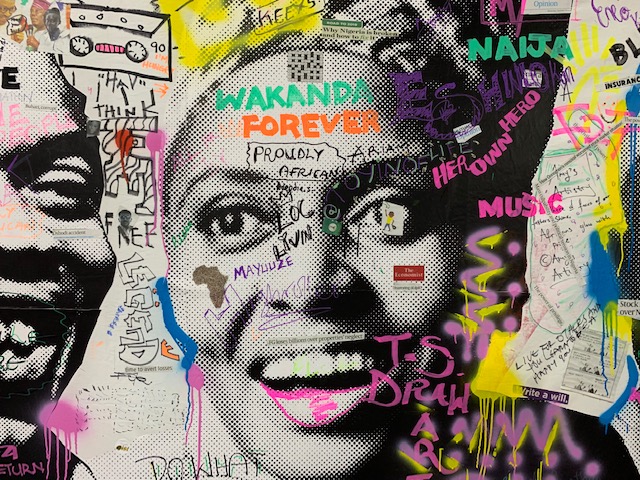[ad_1]
Last week, I traveled around the globe to Nigeria, for Social Media Week Lagos hosted by Afrika21, and it was nothing short of inspiring. 6,000 people attended the five-day conference, and as one of them I was excited to see what Lagos had to offer. With nonstop programming, activations, and networking–it goes without saying that the event was a success. This year’s theme, “STORIES: With Great Influence Comes Great Responsibility,” set the tone as the narrative thread became connectedness as those who traveled from all around the world came together to connect offline and build.
It was my first time on the continent, and bearing the responsibility to spread the word about how black voices are disrupting digital media and woke-bait was a liberating experience.
During the first day of the event, along with other media professionals, I sat on the panel, “Disrupting Digital Media: How Black Voices Are Creating Space & Shaping The Global Narrative” hosted by Huff Post Black Voices. The panel countered the narrative that often conveys that black people aren’t interested in the world around them, i.e., the news. I was surrounded by the intellect of Taryn Finley, Black Voices editor; Collins Teke, founder of Black Voice Media; Lola Emeruwa, founder of Wish Africa; and international gender reporter Abigail Ony Nwaochuocha.

The Disrupting Digital Media Panel (Credit: Adesanya Olufeko)
The goal of the conversation was to highlight how Black people across the globe are creating, mastering, and fostering digital spaces across fields to make our voices heard and bring representation, inclusion, and service to areas that are lacking. By creating companies, brands, communities, apps, and more, we’ve made an indelible mark on the way digital media platforms communicate.
Over 120 people attended the session and left with the understanding of how important it is to own the black narrative no matter how they exist within the diaspora. That conversation lent itself to deep dialogue about how black people could become more connected through digital storytelling and international travels.
In a nutshell, there is a sense of eagerness both in the States and on the continent to be more connected.
How we can connect
Ngozi Odita, who is the founder of Afrika21 and co-founder of Social Media Lagos, and her team worked around the clock for a year to put the event together and strived to have a global impact.
“I think folks across the continent and folks within the diaspora need to understand that we are the same people. So, if you’re talking about prosperity for Africans, you’re talking about prosperity for everybody,” said Odita. “Often times through the course of history it’s always somebody else who’s coming to a country in Africa and is trying to “help” for a lack of better words or coming to set up businesses to create opportunities, but if it’s us, then we’re sure that we’ll serve our own interests. It should be us, and if we’re connecting online and we have this digital paradigm that makes it so easy for us to have conversations, then it should be just as easy for us to collaborate.”
Stay Woke
The following day was one I anticipated as I was set to give my masterclass on the problem with “woke-bait” and social justice propaganda.
During the 75 minute session, attendees and I explored how to identify woke-bait on social media and within advertising campaigns; reporting tools and ways to add to the conversation off and online as well as the impact big business’ wokeness can have on our communities — socially and economically.

Lydia T. Blanco giving a presentation on woke-bait.
With all that is going on in the world politically and with the reality of fake news, the presentation was well received and sparked a lot of conversations around digital community building and how black people can protect themselves from being targets of influencer campaigns on the internet.
Take a look at the presentation for yourself: Who’s Really Woke? Exploring Big Biz Activism & Socially Conscious Marketing Campaigns Online.
People left the masterclass understanding that it’s time to get real about woke-bait and those who make a profit off of black culture and the movements formed and led by us. They also left with an invitation to Black Twitter!
I have to say, my biggest takeaway was learning about the emotional impact news that is disseminated on social media has on people globally.
As the conference continued, there was an overflow of information on the latest trends within various industries, great food, fashion, and deep conversations that pushed people to think about how they can use the social media as a tool for change especially as black people.
All things considered, Odita wants people to know that, “It’s important that if you’re black anywhere that you are trying to uplift black people no matter where you are,” and that is what Social Media Week Lagos is a reminder of.
If you want to see more of my journey, take a look at my Instagram highlights!
[ad_2]
Source link

